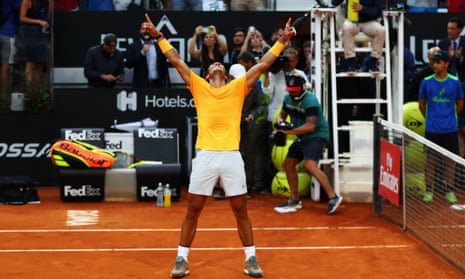A year after Alexander Zverev announced his arrival in the big time by crushing Novak Djokovic to win the Italian Open, the young German held his own but not his crown as Rafael Nadal outlasted him to win his eighth title on the Campo Centrale, 6-1, 1-6, 6-3 in two hours and nine minutes with two rain breaks.
When it was put to him that the rain was not his friend Zverev smiled and nodded. “No, it’s not. But it happens. Nothing you can do about it. He came out way faster, played way more aggressive than I did. It took me a long time to get activated again. I ran out of time. The break took my momentum away.”
Asked how he might convert his good run of three-setters to the much different challenge of a slam, he said: “I will try to play the same way over a longer period of time. But I don’t even want to think about tennis the next few days, then to Paris, where Rafa will be the favourite, no doubt about it.”
Nadal was asked why Zverev has yet to convert his three-set form into success in the slams [he has not got past the fourth round and twice has blown 2-1 leads] and he bridled a little. “Tennis is tennis – best of three, best of five. Five sets is best for the best players and Sacha is one of the best players.”
Ten years separate them in age, there is a gap of $90m in career earnings and the Spaniard now has 70 more titles than the 21-year-old world No 3. But Zverev is here to stay. He is growing in power and confidence and, seeded second in Roger Federer’s absence, he will be a threat at the French Open, which starts on Sunday and where Nadal will reach for his 11th Coupe de Mousquetaires. They cannot meet until the final.
The demands of winning seven best-of-five matches in a row is still a huge ask for Zverev – as it will be for Dominic Thiem, who stopped Nadal’s run of 50 clay sets in a row in Madrid 9 days ago, before losing in the final to Zverev.
The rival most likely to stop Nadal at Roland Garros could still be the man he has played 51 times over 12 years, and whom he beat for the 25th time in the semi-final on Saturday. Djokovic provided an exhausting test of Nadal’s game from start to finish; this was a stop-start skirmish, because of the elements and the efforts of the combatants.
The sharpness the German showed in pushing Kyle Edmund deep and wide in their close third-round battle was not quite there in the early exchanges. He had to take risks he could get away with against lesser players. From there, errors crept into his game.
He had been 40-love up in the sixth game when a lazy forehand handed Nadal another break opportunity and he cashed, in when a return popped up off the net, to go 5-1 up after half an hour. He served out the set, untroubled.
The match was then turned on its head. Zverev put his heart and soul into a fightback and he finally got a look on Nadal’s serve in the second game and forced Nadal wide enough to overstretch on his forehand for the break.
Zverev held to love and, in the space of a few minutes, the complexion of the contest changed from walkover to engaging theatre to potential upset.
The fourth game was pivotal – in the match and possibly in Zverev’s season. He got overexcited when he dumped a forehand when trying to pass Nadal at the net for a 4-0 lead, then lobbed long. He outfoxed him in an exchange of drop shots to grab another break point – this time sealing it with a devastating backhand down the line. His fist-pump to his box screamed defiance and resolve.
The match was taking on an eerie familiarity for Nadal. In Buenos Aires 13 years ago, he beat Gastón Gaudio 0-6, 6-0, 6-1. There would be no bagel – nobody has done that to him since Roger Federer in Hamburg nine years ago – but he could not stop Zverev wrapping up the set 6-1 with another unreachable backhand.
Zverev played a drop-shot to engineer the break at the start of the final frame – and, as the rain arrived, he held for 2-0. The gathering – including most of Nadal’s family – took in a gasp of warm, moist air. For Zverev, impatient to finish the job, a 22-minute pause to let the showers pass was a minor irritant. For Nadal, it allowed him time to regroup and when they resumed ever so briefly in a light drizzle he held for 2-3. Again, the rain held up the royal progress.
Nadal was asking the more searching questions. His whipped forehand was down from a tournament average of 193kph to 167kph, yet he still bossed the important exchanges with angles and timing.
Trailing in the serving cycle, Zverev struggled to control his temperament and his opponent. Another attacking lob drifted long and Nadal finished the job with a backhand drop shot that not even the fleet-footed Zverev could reach.

Comments (…)
Sign in or create your Guardian account to join the discussion